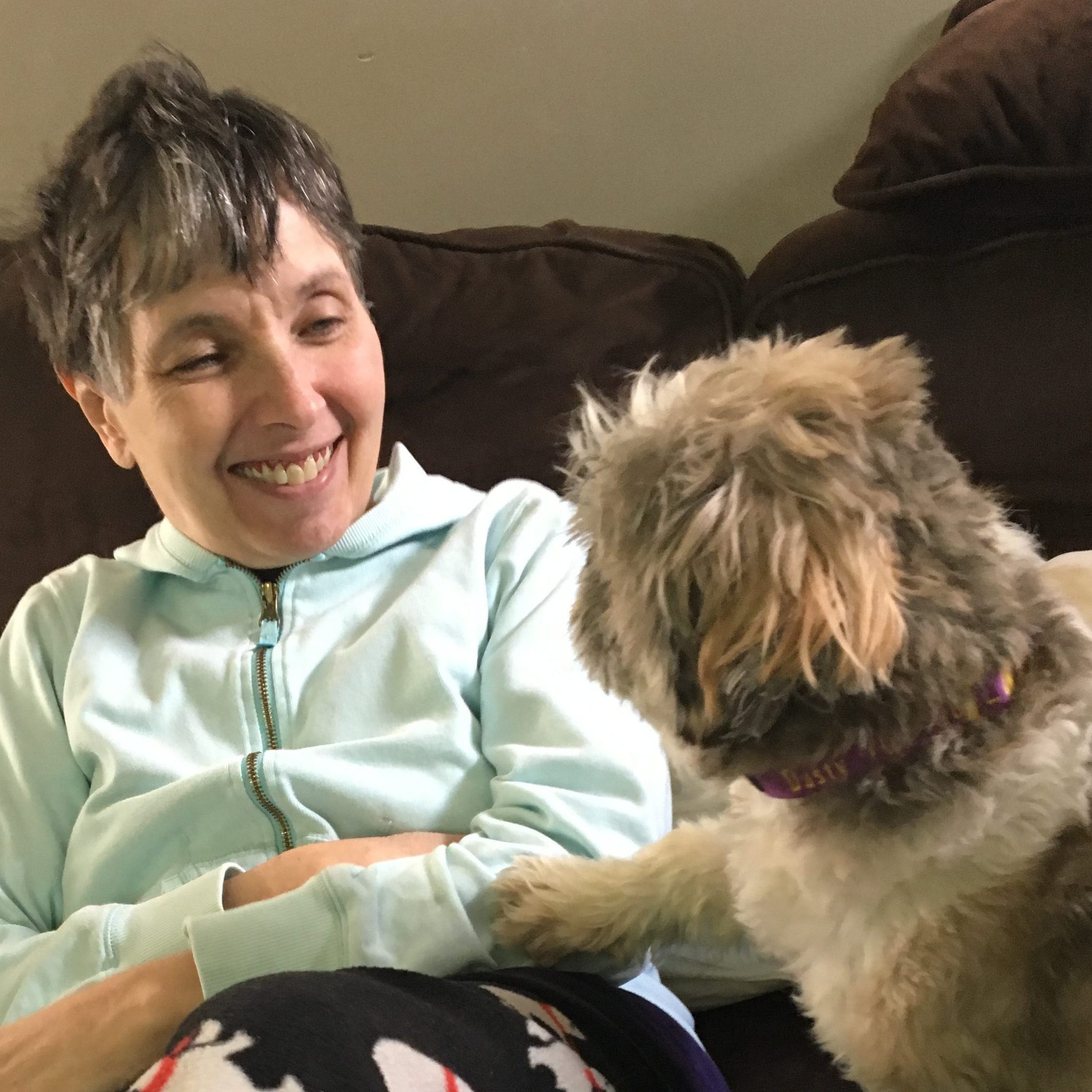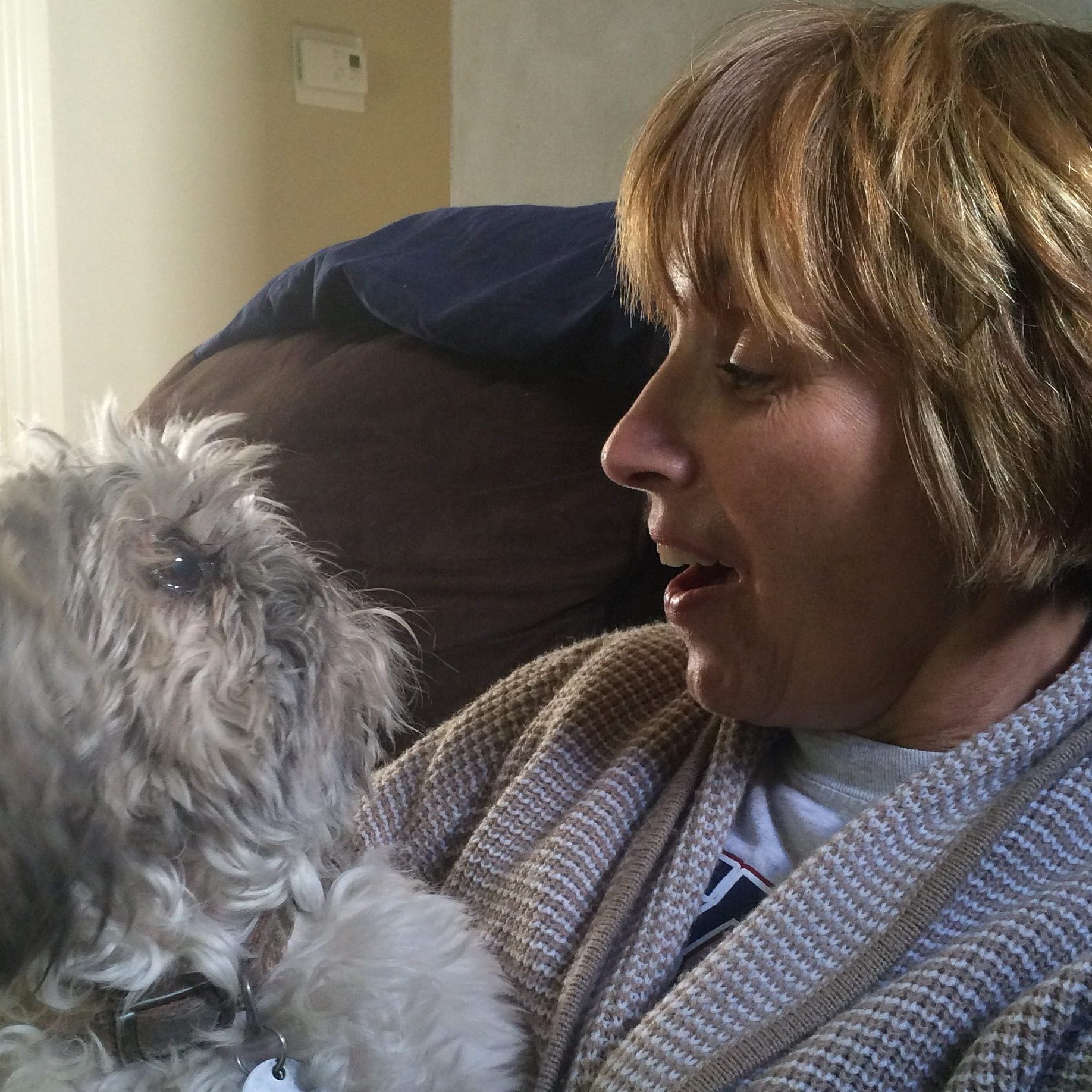The Healing Power of a Pet: Pets and Alzheimer’s disease
Team Suzy makes a difference with the help of AFA grant funding. Alzheimer’s TODAY sat with Mike Plaskey, founder of Team Suzy, to discuss the relationship between pets and Alzheimer’s disease.
Suzy Plaskey was walking her dog, Dusty, in her familiar Michigan neighborhood when suddenly it was no longer familiar. She called her husband, Mike, who was on the road for business and told him, “I’m lost.” He asked if she recognized anything and she said no. He then asked if Dusty was with her. When she said that he was, Mike told her to let Dusty go and the little shih tzu would run right home, leading the way. As much as she wanted to get home, Suzy would not release Dusty.
The two had always been close, but after Suzy was diagnosed with early onset Alzheimer’s, also called young-onset, in her mid-50s, their bond deepened to the point where they were practically inseparable. Mike understood this.
“Dusty was her safety,” he said. “She was only a block away. Dusty could have taken her home. That reinforced to me the power of a pet. There was no way she would let go.”

Suzy and Mike were married for more than 30 years and have three children. After Suzy died in January 2020, having lived with Alzheimer’s for eight years, Plaskey wanted to find a way to put that power of a pet to work for more people. Two months later, he sat in the basement of his nephew Jimmie to brainstorm. Out of that came the Team Suzy Companion Pet Program. Over the next year he worked to secure nonprofit status and met with Michigan Humane to partner in creating a way to connect pets in need of a home with people experiencing memory loss.

“This can help people on a daily basis,” he says. Team Suzy will issue a grant to the family to cover expenses of daily care such as food, toys, leashes and help with some veterinary care for the life of the person or pet. Plaskey expects the cost will be about $2,500 a year for each dog or cat. Eligibility requires that the person with dementia must live at home or with a caregiver and the adoption process must be completed exclusively with Michigan Humane. Matthew Pepper, Michigan Humane’s president and CEO, was brought onboard through a mutual connection, Gary May, a producer of its annual telethon on Detroit’s WXYZ-TV, who had studied the impact pets have on people’s lives and was enthusiastic about Plaskey’s plans. He arranged a lunch between the two men.
“It made perfect sense to me knowing the role animals can play in mental health,” Pepper said. “Mike is fully into it. I think we shook hands that day and the rest is history. Those are the kind of people we want to partner with.” Pepper sees the benefits to all involved. The pet goes to a loving home and the person living with memory loss can experience improved health, such as lower blood pressure and elevated mood and awareness, through the animal’s presence.
Pets and Alzheimer’s: the impact on a caregiver

The caregiver also benefits, Pepper says. “While the person is with the dog, they get a break to take some time for themself and allow the dog to fill the role of caregiver for a time. This is necessary for someone giving everything to help someone with Alzheimer’s and dementia.”
Michigan Humane will spay or neuter the animal and ensure that it is medically and emotionally ready, as it does with all adoptions. For people going through Team Suzy, the adoption fee will be waived and veterinarian services will be provided in the time following the placement. Because of the nationwide vet shortage, Michigan Humane will help find vet care for Team Suzy adopters after the initial care.
Pets and Alzheimer’s: implications for other illnesses
Pepper says his organization is now working on connections with autism and Parkinson’s nonprofits “to elevate our narrative so we’re not just supporting the animal; we’re here to create safer and healthier communities….What the animal brings mirrors what pharmas do.” Two families are in the application process, and Plaskey is exploring the possibility of forming a connection with a local care facility that has an independent living residence and a memory care unit in the same building. He envisions having people in the independent living residence adopt a dog or cat with the agreement that they will take the pet visiting in the memory care unit once a week in exchange for the waived adoption fee, veterinary care and annual support from Team Suzy.
“All the studies out there, and there are so many, show the power of pets for emotional health,” he said, adding that he reached out to mental health professionals at the University of Michigan and Toledo University to tell them about Team Suzy and offered to share his experiences. A requirement of the adoption application is that families will fill out a monthly evaluation form. “I’m not a scientist, but if you tell me what to look for I can.”
The strong possibility of replication is one of the reasons AFA awarded Team Suzy its $25,000 Anne & Irving Brodsky Innovation Grant in 2022. The grant, created by AFA founder and board chairman Bert E. Brodsky, is awarded annually to help fund creative programs that improve the lives of individuals living with Alzheimer’s or related illnesses and their families. “The Brodsky grant for me was very emotional, that other people believed in what we’re doing,” said Plaskey who is now retired and devotes full time to Team Suzy. “We know it will be replicable. The collaboration with Michigan Humane is what makes it work. Once it gets rolling it’s almost a no-brainer.” Pepper agrees.
“If anyone reads this and has possible plans, reach out to us. There’s no question, this is going to work and change people’s lives.”
Photos courtesy of Mike Plaskey
For more information, visit www.teamsuzy.org.





